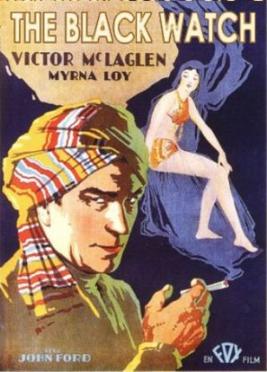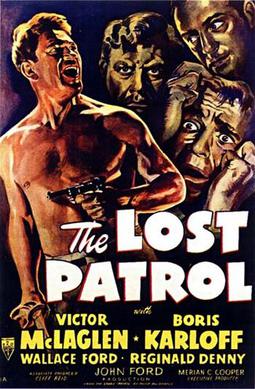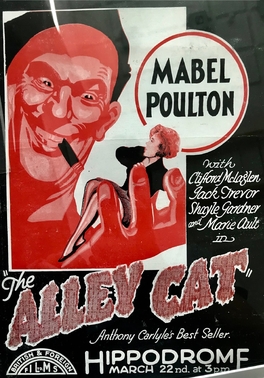
Victor Andrew de Bier Everleigh McLaglen was a British-American actor and boxer. His film career spanned from the early 1920s through the 1950s, initially as a leading man, though he was better known for his character acting. He was a well-known member of John Ford’s Stock Company, appearing in 12 of the director’s films, seven of which co-starred John Wayne.

The Informer is a 1935 American drama thriller film directed and produced by John Ford, adapted by Dudley Nichols from the 1925 novel of the same title by Irish novelist Liam O'Flaherty. Set in 1922, the plot concerns the underside of the Irish War of Independence and centers on a disgraced Republican man, played by Victor McLaglen, who anonymously informs on his former comrades and spirals into guilt as his treachery becomes known. Heather Angel, Preston Foster, Margot Grahame, Wallace Ford, Una O'Connor and J. M. Kerrigan co-star. The novel had previously been adapted for a British film of the same name in 1929.

The Black Watch is a 1929 American Pre-Code adventure epic film directed by John Ford and starring Victor McLaglen, Myrna Loy, and David Torrence. It was written by James Kevin McGuinness and based on the 1916 novel King of the Khyber Rifles by Talbot Mundy. The film features an uncredited 21-year-old John Wayne working as an extra; he also worked in the arts and costume department for the film. This was director John Ford's first sound film.

Sahara is a 1983 British-American adventure drama film directed by Andrew McLaglen and starring Brooke Shields, Lambert Wilson, Horst Buchholz, John Rhys-Davies and John Mills. The original music score was composed by Ennio Morricone.
Andrew Victor McLaglen was a British-born American film and television director, known for Westerns and adventure films, often starring John Wayne or James Stewart.
The Lost Patrol or Lost Patrol may refer to:

The Lost Patrol is a 1934 American pre-Code war film by RKO, directed and produced by John Ford, with Merian C. Cooper as executive producer and Cliff Reid as associate producer from a screenplay by Dudley Nichols from the 1927 novel Patrol by Philip MacDonald. Max Steiner provided the Oscar-nominated score. The film, a remake of a 1929 British silent film, starred Victor McLaglen, Boris Karloff, Wallace Ford, Reginald Denny, J. M. Kerrigan and Alan Hale.

Money for Speed is a 1933 British sports drama film directed by Bernard Vorhaus and starring John Loder, Ida Lupino, Cyril McLaglen and Moore Marriott. It is centered on the sport of speedway racing, which was at its peak of popularity at the time.
Cyril McLaglen was a British actor who appeared in a variety of films between 1920 and 1951. He was born in London in 1899 and made his film debut in the 1920 film The Call of the Road. He was the younger brother of the actor Victor McLaglen.
Walter Summers (1892–1973) was a British film director and screenwriter.
Lost Patrol is a 1929 British silent war film directed by Walter Summers and starring Cyril McLaglen, Sam Wilkinson and Terence Collier. The film was made at Welwyn Studios by British Instructional Films. It was based on the 1927 novel Patrol by Philip MacDonald. It was remade in 1934 by John Ford.
Clifford McLaglen was a Stepney, London or Cape Town, Cape Colony - born British film actor. He was one of nine or ten children and brother of several actors including Victor McLaglen, Oscar winner for best actor, The Informer, and nominated for best supporting actor The Quiet Man.
Boadicea is a 1927 British historical film directed by Sinclair Hill and starring Phyllis Neilson-Terry, Lillian Hall-Davis, and Clifford McLaglen. It depicts the life of the Celtic Queen Boudica (Boadicea) and her rebellion against the Roman Empire.
Quinneys is a 1927 British romance film directed by Maurice Elvey and starring John Longden, Alma Taylor and Henry Vibart. It is an adaptation of the play Quinneys by Horace Annesley Vachell. David Lean worked on the film as a camera assistant. It was made by Gaumont British at their Lime Grove Studios.

The Flight Commander is a 1927 British silent war film directed by Maurice Elvey and starring Alan Cobham, Estelle Brody and John Stuart. It was made by British Gaumont at their Lime Grove Studios in Shepherd's Bush. The celebrated First World War pilot Alan Cobham appeared as himself. It is also known by the alternative title of With Cobham to the Cape.

The Alley Cat is a 1929 British-German silent drama film directed by Hans Steinhoff and starring Mabel Poulton, Jack Trevor and Clifford McLaglen. The film was made as a co-production between the British company British & Foreign and the German Orplid-Film. Its German title was Nachtgestalten. The film was shot in Britain, partly on location around the Docklands in London. Studio shooting took place at the Grunewald Studios in Berlin. It was based on a novel by Anthony Carlyle.
A Sailor Tramp is a 1922 British silent adventure film directed by Floyd Martin Thornton and starring Victor McLaglen, Pauline Johnson and Hugh E. Wright. It was based on a 1902 novel by Bart Kennedy.

Land Without Women is a 1929 German drama film directed by Carmine Gallone and starring Conrad Veidt, Elga Brink and Clifford McLaglen. It was based on the novel Die Braut Nr. 68 by Peter Bolt. The film is set amongst a community of gold diggers in Western Australia. It was shot at the Staaken and Templehof Studios in Berlin with sets designed by the art directors Hans Sohnle and Otto Erdmann. It was made by the small independent production company Felsom Film using the Tri-Ergon sound-on-film process, the first full-length German-speaking sound film to be released. It was followed a month later by the first all-talking film Atlantik, which had been made in Britain.
White Slippers is a 1924 British silent adventure film directed by Sinclair Hill and starring Matheson Lang, Joan Lockton and Gordon Hopkirk. It was based on a novel by Charles Edholm. It is set in Mexico and is known by the alternative title The Port of Lost Souls.
In the Blood is a 1923 British silent sports drama film directed by Walter West and starring Victor McLaglen, Lilian Douglas and Cecil Morton York.









